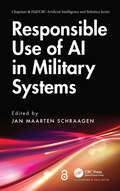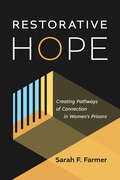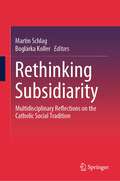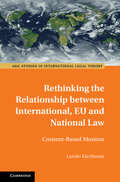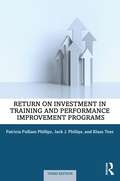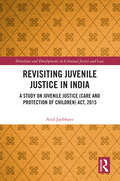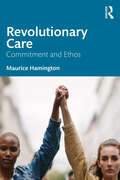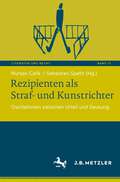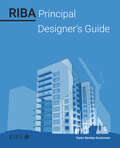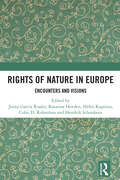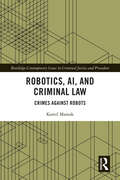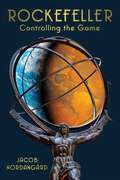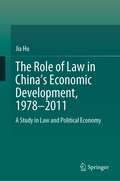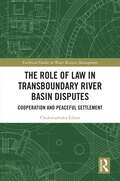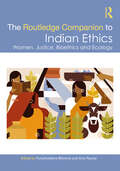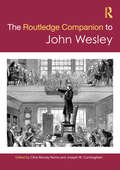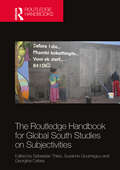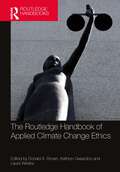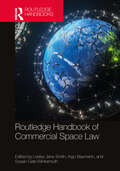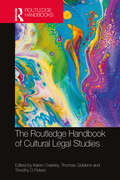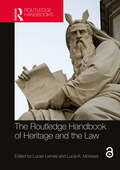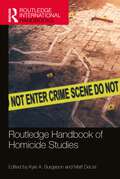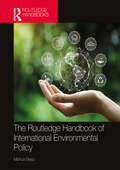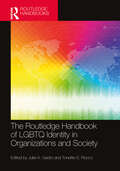- Table View
- List View
Responsible Use of AI in Military Systems (Chapman & Hall/CRC Artificial Intelligence and Robotics Series)
by Jan Maarten SchraagenArtificial Intelligence (AI) is widely used in society today. The (mis)use of biased data sets in machine learning applications is well‑known, resulting in discrimination and exclusion of citizens. Another example is the use of non‑transparent algorithms that can’t explain themselves to users, resulting in the AI not being trusted and therefore not being used when it might be beneficial to use it.Responsible Use of AI in Military Systems lays out what is required to develop and use AI in military systems in a responsible manner. Current developments in the emerging field of Responsible AI as applied to military systems in general (not merely weapons systems) are discussed. The book takes a broad and transdisciplinary scope by including contributions from the fields of philosophy, law, human factors, AI, systems engineering, and policy development.Divided into five sections, Section I covers various practical models and approaches to implementing military AI responsibly; Section II focuses on liability and accountability of individuals and states; Section III deals with human control in human‑AI military teams; Section IV addresses policy aspects such as multilateral security negotiations; and Section V focuses on ‘autonomy’ and ‘meaningful human control’ in weapons systems.Key Features: Takes a broad transdisciplinary approach to responsible AI Examines military systems in the broad sense of the word Focuses on the practical development and use of responsible AI Presents a coherent set of chapters, as all authors spent two days discussing each other’s work This book provides the reader with a broad overview of all relevant aspects involved with the responsible development, deployment and use of AI in military systems. It stresses both the advantages of AI as well as the potential downsides of including AI in military systems.
Restorative Hope: Creating Pathways of Connection in Women's Prisons
by Sarah F. FarmerHow theological education can engender life-giving hope for incarcerated women Amid dehumanizing conditions, incarcerated people strive to generate hope. As one returning citizen explains, &“Hope is not just sitting around waiting for things to change. Hope is not always an individual making things change. Hope is sometimes a community making things change.&” What can theologians, teachers, and chaplains do to assist their work? Sarah F. Farmer amplifies the voices of women who are or have been incarcerated to learn what supports their flourishing. Combining theology and sociology, Farmer shows how theological education can help cultivate the resilience and connection that women describe as life-giving in and after prison. Based in her own ministry, this pedagogy incorporates artistic expression and critical thinking about justice to cultivate agency. Restorative Hope will open readers&’ eyes to the lived realities of the US penitentiary system. Educators and theologians seeking to serve those in prison will find a wealth of firsthand perspective and practical resources in these pages.
Rethinking Subsidiarity: Multidisciplinary Reflections on the Catholic Social Tradition
by Martin Schlag Boglárka KollerThis book takes a fresh and interdisciplinary approach to the concept of subsidiarity. While subsidiarity is commonly understood as an organizational principle that assigns competences to the appropriate level within an organization, its application extends beyond politics. This innovative book offers a comprehensive analysis that includes religious and secular perspectives, exploring the relevance of subsidiarity to society, business, law and politics.By bridging the gap between theology, philosophy, political science, law, and history, this volume fills a significant gap in the literature. It reexamines the ideological foundations of subsidiarity within the Catholic social tradition, investigates its practical implications, and questions how it can address the challenges faced by contemporary business environments, particularly issues of social inequity. With a normative and conceptual approach, the book critically reflects on the links between subsidiarity and themes such as responsible business practices, ecological concerns, individual autonomy, and the common good. By exploring the potential of subsidiarity to overcome dichotomies and promote a middle ground between government-based solutions and individual freedom, the volume offers valuable insights and practical solutions.This volume stands out as the first major study dedicated to subsidiarity in society, business, law and politics. Through its multidisciplinary lens, it sheds light on unexplored connections and highlights the role of subsidiarity in fostering ethical and socially responsible behavior. It is an essential resource for researchers, PhD and graduate students, as well as professionals in theology, philosophy, political sciences, law, and history who seek a comprehensive understanding of subsidiarity and its implications for contemporary issues.
Rethinking the Relationship between International, EU and National Law: Consent-Based Monism (ASIL Studies in International Legal Theory)
by null Lando KirchmairThe interdisciplinary embedding and novel conceptual approach offered in the book to address the relationship between legal orders offers a significant and original contribution to the literature. The first part of the book provides a critical account of dominant approaches to explain this relationship where theories of Kelsenian monism, dualism, legal pluralism and constitutionalism are criticized. In the second part, Kirchmair engages with an innovative idea by applying insights from social contract theory to the relationship between international, EU and Member State law and establishes his theoretical approach: Consent-Based Monism. The book focuses on the most important structural characteristics of the external relations law of the EU as well as the primacy of EU law in lieu of national constitutional identity which is demonstrated in part three.
Return on Investment in Training and Performance Improvement Programs
by Patricia Pulliam Phillips Jack J. Phillips Klaas ToesThe third edition of this bestselling book guides you through a proven, results-based approach to calculating the return on investment in training and performance improvement programs. The ROI Methodology described in the book has evolved into the most used evaluation system in the world.Patricia Pulliam Phillips, Jack J. Phillips, and Klaas Toes present the ROI Methodology, a user-friendly approach to showing and proving the value of programs, projects, and initiatives. Based on over 40 years of development and refinement, it is a process that meets the demands currently facing training and performance improvement functions. This third edition includes chapters thoroughly detailing the application of the ROI Methodology and new and innovative developments. The book provides examples, case studies and worksheets, and solutions to implementation issues. A case study spans the book and takes the reader through each part of the ROI Methodology. Readers can work through the case, step-by-step, exploring the issues uncovered in the chapter and learn how to apply the process in their own organizations. This book continues to be a primary reference for learning how to utilize ROI to show the contribution of training, education, learning systems, performance improvement, human resources, and change initiatives throughout organizations.Proven to work as a guide for practitioners, managers, and leaders, the book is also ideal for students of learning and development and performance improvement at graduate and postgraduate levels and individuals involved in executive and professional development programs. A complimentary 500-page book with 25 detailed case studies is available to book purchasers. See the offer on page 384 at the back of the book.
Revisiting Juvenile Justice in India: A Study on Juvenile Justice (Care and Protection of Children) Act, 2015 (Directions And Developments In Criminal Justice And Law Ser.)
by Atul JaybhayeRevisiting Juvenile Justice in India analyses the challenges and issues involved in the study of juvenile justice in India. The book compares the juvenile justice systems of the USA, the UK and China with India to identify causes of juvenile delinquency and the measures to curb it. It traces the origin of juvenile justice in India and its evolution through landmark judgments. The book critically analyses the Nirbhaya Rape Case of 2012, analyzing the age of criminal responsibility for juveniles and the need for new juvenile justice laws which lead to the passing of the Juvenile Justice (Care of Protection of Children) Act, 2015. The book studies international conventions upholding the rights of children i.e., UNCRC, Beijing Rules, Riyadh Guidelines, etc. and the legal framework for child protection in India and its relevance to juvenile justice. This book will be useful for undergraduate and postgraduate law students, advocates, criminal law practitioners, officers/staff of the correction homes, Judges of the Juvenile Justice Board, and research scholars.
Revolutionary Care: Commitment and Ethos
by Maurice HamingtonWritten by one of the world’s most respected care scholars, Revolutionary Care provides original theoretical insights and novel applications to offer a comprehensive approach to care as personal, political, and revolutionary. The text has nine chapters divided into two major sections. Section 1, "Thinking About Better Care," offers four theoretical chapters that reinforce the primacy of care as a moral ideal worthy of widespread commitment across ideological and cultural differences. Unlike other moral approaches, care is framed as a process morality and provides a general trajectory that can only determine the best course of action in the moment/context of need. Section 2, "Invitations and Provocations: Imagining Transformative Possibilities," employs four case studies on toxic masculinity, socialism and care economy, humanism and posthumanism, pacifism, and veganism to demonstrate the radical and revolutionary nature of care. Exploring the thinking and writing of many disciplines, including authors of color, queer scholars, and indigenous thinkers, this book is an exciting and cutting-edge contribution to care ethics scholarship as well as a useful teaching resource.
Rezipienten als Straf- und Kunstrichter: Oszillationen zwischen Urteil und Deutung (Literatur und Recht #11)
by Nursan Celik Sebastian SpethRechtsprechung steht unter dem Diktat der Urteilspflicht und muss Mehrdeutigkeit daher einhegen und urteilend auflösen. Literatur hält Formen und Prozesse von Mehrdeutigkeit dagegen ohne Schwierigkeit aus. Sie werden als Potenzierung der ästhetischen Qualität sogar gerühmt und forciert. Die Beiträge des vorliegenden Bandes sind Texten und Rezeptionszusammenhängen gewidmet, die Rezipientinnen und Rezipienten explizit in eine Richterposition setzen. Konkret geht es um literarische Phänomene, bei denen Rezipierende nicht bloß verstehen und deuten, sondern (be- und ver-)urteilen – zum einen im engen (juristischen) und zum anderen im weiten (ästhetischen) Sinne des Urteilsbegriffs. Zu unterscheiden sind hierbei Laienurteile in Strafsachen und die Einforderung professioneller Urteile, bei denen Leserinnen und Leser (metaphorisch) als Kunstrichter angesprochen, konstruiert oder zu agieren verpflichtet werden. Das literaturgeschichtliche Spektrum reicht dabei vom 18. Jahrhundert bis zur Gegenwart, mit einem Schwerpunkt im frühen 20. Jahrhundert.
RIBA Principal Designer's Guide
by Dieter Bentley-GockmannThe RIBA Principal Designer Guide, a companion guide to the RIBA Health and Safety Guide, provides architects with an essential understanding of the Principal Designer duties under the Construction (Design and Management) Regulations and Building Safety Act Dutyholder Regulations. To ensure chartered architects are reaching a high standard of knowledge, the RIBA has introduced an online test based on a comprehensive curriculum to test for competency. The must-have content considers details of the relevant statutory duties, guidance regarding the implications of those duties for project delivery and examples of documents, templates and schedules that Principal Designers could use to manage, track and demonstrate compliance with the duties. This guide also includes guidance on the competence requirements for Principal Designers with content mapped against BSI Flex 8670 and PAS 8671 that enables readers to demonstrate their competence.
Rights of Nature in Europe: Encounters and Visions
by Jenny García Ruales Katarina Hovden Helen Kopnina Colin D. Robertson Hendrik SchoukensThis book addresses the recognition of the Rights of Nature (RoN) in Europe, examining their conceptualisation and implementation. RoN refers to a diverse set of legal developments that seek to redefine Nature's status within the law, gradually emerging as a novel template for environmental protection. Countries like Ecuador and New Zealand, each with distinct histories and ways of dwelling in the world, have pioneered a new era in environmental governance by legally acknowledging rights or personhood for nature, ecosystems, and more-than-human populations.In recent years, Europe has witnessed growing interest in RoN, with academic, legislative, and political initiatives gaining momentum. A significant development is the September 2022 passage of a law in the Spanish Parliament, granting legal personhood and rights to the Mar Menor, a saltwater lagoon severely affected by environmental degradation.Given the diversity in interpretations and articulations of ‘Rights of Nature’, this edited volume argues that their arrival in Europe fosters different kinds of interactions across distinct areas of law, knowledge, practices, and societal domains. The book employs a multidisciplinary approach, exploring these interactions in law and policy, anthropology, Indigenous worldviews and jurisprudence, philosophy, spiritual traditions, critical theory, animal communication, psychology, and social work.This book is tailored for scholars in law, political science, environmental studies, anthropology and cultural studies; as well as legal practitioners, NGOs, activists and policy-makers interested in ecology and environmental protection.
Robotics, AI and Criminal Law: Crimes Against Robots (Routledge Contemporary Issues in Criminal Justice and Procedure)
by Kamil MamakThis book offers a phenomenological perspective on the criminal law debate on robots. Today, robots are protected in some form by criminal law. A robot is a person’s property and is protected as property. This book presents the different rationale for protecting robots beyond the property justification based on the phenomenology of human-robot interactions. By focusing on robots that have bodies and act in the physical world in social contexts, the work provides an assessment of the issues that emerge from human interaction with robots, going beyond perspectives focused solely on artificial intelligence (AI). Here, a phenomenological approach does not replace ontological concerns, but complements them. The book addresses the following key areas: Regulation of robots and AI; Ethics of AI and robotics; and philosophy of criminal law. It will be of interest to researchers and academics working in the areas of Criminal Law, Technology and Law and Legal Philosophy.
Rockefeller: Controlling the Game
by Jacob NordangårdWhy would the first family of oil so ardently support environmental climate research and activism? Join author and researcher Jacob Nordangård as he uncovers the whole sordid truth. The Rockefeller family is one of the richest in the world. Yet, why would the family that made the world dependent on oil fund environmental and climate research since the 1950s, help shape climate policy measures since the 1980s, and supported climate activism since the 1990s? Rockefeller: Controlling the Game is the thrilling and paradoxical story of one of the world's most influential global players. Through its top position in American business, close contacts with the White House, and with their immense financial power as one of the world's leading private research funders, the Rockefellers have been able to anchor the climate issue both scientifically and politically. Yet what is the reasoning behind doing so? Author and researcher Jacob Nordangård follows the family from the founding of Standard Oil and the Rockefeller Foundation, up through the aftermath of the Paris Agreement, with the declaration of the Fourth Industrial Revolution in January 2016, to the present day. Nordangård's in-depth research includes the large quantities of new material recently made available on the Internet, as well as the Rockefeller Foundation's own annual reports. Nordangård's main focus is the Rockefeller family's involvement in climate research and politics, but the actions and motives of some of their allies are also explored, as well as the family's influence on the development of modern medicine, family planning, agriculture, art, architecture, behavioral science, information technology, and politics. The Rockefeller family's utopian dream of a perfect world will have serious consequences for the survival of the human species and life as we know it. The Rockefeller Foundation's stated mission to "promote the well-being of humanity throughout the world" has a dark flipside, as, Nordangård will prove, the Rockefeller family's long-standing battle against climate change contains elements of sophisticated propaganda techniques, futurism, and New Age philosophy, aiming at a complete transformation of the whole earth system, including economy, ecology, culture, and even humanity itself.
The Role of Law in China’s Economic Development, 1978–2011: A Study in Law and Political Economy
by Jia HuThis book concerns how China's legal institutions promoted its economic growth and demonstrates that the law has played different roles at various stages of China's economic transformation, a signal of legal paradigm shifts in reaction to the changing political and economic pursuits.By decomposing the role of law in the process, the author argues that while the Chinese economy was transforming from a planned economy to a market-oriented one, the law also made its adjustment as a response—the Chinese legal system was evolving from the one consisting of primarily substantive laws to the one filled with high-level formal laws by the end of the last century. The above observation of legal formalization is further consolidated by introducing the particularities of China's legal education in those years—a topic rarely dealt with yet of significance to comprehensively understand the Chinese legal system in practice. Overall, the present book argues against the modernization theory and determinism that would anticipate a similar developmental path globally and shows that the relationship between law and economic development is contingent. Therefrom, this study weighs in the law and development debate and breaks a perception of static law in the economy by rejecting the conventional perception of established legal institutions as a precondition of modernity.Hence, this book could appeal to legal scholars and sociologists interested in reevaluating western theories of free economy and its relationships to the law. In addition, scholars interested in research methodology would find the perspective of paradigm shifts in interpreting China's transformations a helpful analytical framework in research. Moreover, policymakers and legislators concerned about the characteristics of law for economic results would also find the book useful.
The Role of Law in Transboundary River Basin Disputes: Cooperation and Peaceful Settlement (Earthscan Studies in Water Resource Management)
by Chukwuebuka EdumThis book examines the role legal rules play in the resolution of disputes in transboundary river basins. When states fail to resolve disputes over shared water resources, many cast such failures on inadequate or ineffective legal rules. With this view in mind, this book examines the role that legal rules do, and can, play in aiding the peaceful settlement of disputes and furthering cooperation between different parties. Building on the interactional theory of law, this book formulates three analytical frameworks: the effect of norm-generating processes, the effects of water-related agreements and/or arrangements in the basins, and the effect of international water. It uses these frameworks to assess the role of law in the processes of cooperation and peaceful settlement of disputes on transboundary river basin by drawing on four illustrative case studies: the Jordan River Basin, the Nile River Basin, the Mekong River Basin, and the Indus River Basin. In doing so, this book presents a unique perspective on the multi-functional role of legal rules in those processes. Tapping into the global discussion on water security and water-related conflicts, this book stimulates readers to explore broader or interdisciplinary perspectives for understanding water-related issues. This book will be of great interest to students and scholars interested in water resource management, water law, environmental politics, conflict resolution, and sustainable development more generally.
The Routledge Companion to Indian Ethics: Women, Justice, Bioethics and Ecology
by Purushottama Bilimoria Amy RaynerThis companion volume focuses on the application and practical ramifications of Indian ethics. Here Indian dharma ethics is moved from its preeminent religious origins and classical metaethical proclivity to, what Kant would call, practical reason – or in Aristotle’s poignant terms, ēhikos and phronēis –and in more modern parlance normative ethics. Our study examines a wide range of social and normative challenges facing people in such diverse areas as women’s rights, infant ethics, politics, law, justice, bioethics and ecology. As a contemporary volume, it builds linkages between existing theories and emerging moral issues, problems and questions in today’s India in the global arena. The volume brings together contributions from some 40 philosophers and contemporary thinkers on practical ethics, exploring both the scope and boundaries or limits of ethics as applied to everyday and real-life concerns and socio-economic challenges facing India in the context of a troubled globalizing world. As such, this collection draws on multiple forms of writing and research, including narrative ethics, interviews, critical case studies and textual analyses.The book will be of interest to scholars, researchers and students of Indian philosophy, Indian ethics, women and infant issues, social justice, environmental ethics, bioethics, animal ethics and cross-cultural responses to dominant Western moral thought. It will also be useful to researchers working on the intersection of Gandhi, sustainability, ecology, theology, feminism, comparative philosophy and dharma studies.
The Routledge Companion to John Wesley (Routledge Religion Companions)
by Clive Norris Joseph CunninghamThe Routledge Companion to John Wesley provides an overview of the work and ideas of one of the principal founders of Methodism, John Wesley (1703-91). Wesley remains highly influential, especially within the worldwide Methodist movement of some eighty million people. As a preacher and religious reformer his efforts led to the rise of a global Protestant movement, but the wide-ranging topics addressed in his writings also suggest a mind steeped in the intellectual developments of the North Atlantic, early modern world. His numerous publications cover not only theology but ethics, history, aesthetics, politics, human rights, health and wellbeing, cosmology and ecology. This volume places Wesley within his eighteenth-century context, analyzes his contribution to thought across his multiple interests, and assesses his continuing relevance today. It contains essays by an international team of scholars, drawn from within the Methodist tradition and beyond. This is a valuable reference particularly for scholars of Methodist Studies, theology, church history and religious history.
The Routledge Handbook for Global South Studies on Subjectivities (Transdisciplinary Souths)
by Sebastian Thies Susanne Goumegou Georgina CebeyThe Routledge Handbook for Global South Studies on Subjectivities provides a series of exemplary studies conjoining perspectives from Asian, African, and Latin American Studies on subjectivity in the Global South as a central category of social and cultural analysis. The contestation of the Northern myth of the autonomous subject—the dispositive that contests subject formation in the South by describing it as fragmented, incomplete, delayed or simply deviant, has been a cornerstone of theory production from the South over the years.This volume’s contributions offer an interdisciplinary and transarea dialogue, reframing issues of selfhood and alterity, of personhood, of the human, of the commons and contesting the North’s presumption in determining what kind of subjectivities abide by its norms, whose voices are heard, who is recognised as a subject, and, by extension, whose lives matter. In the context of the shifting dynamics of today’s manifold crises, they raise questions regarding how subjectivities act on or resist such forms of contestation, contingency, and indeterminacy.A major contribution to the growing body of scholarship on the Global South, this handbook will be an essential resource for students, scholars, researchers and instructors in literature, media and culture studies, sociology, anthropology, philosophy, law, politics, visual arts and art history.
The Routledge Handbook of Applied Climate Change Ethics (Routledge Handbooks in Applied Ethics)
by Donald A. Brown Kathryn Gwiazdon Laura WestraThe Routledge Handbook of Applied Climate Change Ethics is a powerful reference source for the identification and exploration of the underlying ethical issues in climate change law and policy. Bridging theory with practice, it takes ethical engagement out of the classroom and into the halls of governance. The Handbook‘s 39 chapters--written by a diverse and inter-disciplinary team of experts from around the world--are case studies divided into five parts. Parts I-IV highlight the ethical issues that arise in climate change policy formation, from duties not to harm to duties to consider the views and voices of those who will be, or are being, harmed; from the role of human rights, justice, and democracy to how to identify and respond to disinformation and denialism. It also raises the ethics of various policy responses, such as cap-and-trade, carbon taxing, and geo-engineering. Part V offers a way forward, with strategies on how to expressly consider ethics in climate change policy formation, from negotiations to education, media, communication, and the power and potential of shaming. The volume is essential reading for students, professors, and practitioners who wish to better engage with government and non-government organizations on climate policy, to better understand the practical application of the theory and philosophy of ethics, and how to more strongly draft and defend ethical action in negotiating, drafting, and defending climate change law and policy.
Routledge Handbook of Commercial Space Law (Routledge Handbooks in Law)
by Lesley Jane Smith, Ingo Baumann, and Susan-Gale WintermuthThe Routledge Handbook of Commercial Space Law provides a definitive survey of the transitions and adjustments across the stakeholder community contributing to outer space activities. The interaction between NewSpace, traditional aerospace industrials, and non-traditional space-related technologies is driving market changes which will affect state practice in what has until now been a government dominated market. Greater private commercial participation will lead to new economic approaches to risk-sharing models driven by a space services dominated market. This handbook is a detailed reference source of original articles which analyse and critically evaluate the scope of the current paradigm change, and explain why space contracts and risk apportionment as currently known will change in tune with ongoing market transitions. Reference is made to the scope of best practices across various leading states involved in space activities. With contributions from a selection of highly regarded and leading scholars and practitioners in the Commercial Space Law field, and the inclusion of salient documents, regulatory and contractual documents, the Routledge Handbook of Commercial Space Law is an essential resource for students, scholars, and practitioners who are interested in the field of Commercial Space Law.
The Routledge Handbook of Cultural Legal Studies
by Karen Crawley Thomas Giddens Timothy D PetersThis handbook provides a comprehensive introduction to the cutting-edge field of cultural legal studies.Cultural legal studies is at the forefront of the legal discipline, questioning not only doctrine or social context, but how the concerns of legality are distributed and encountered through a range of material forms. Growing out of the interdisciplinary turn in critical legal studies and jurisprudence that took place in the latter quarter of the 20th century, cultural legal studies exists at the intersection of a range of traditional disciplinary areas: legal studies, cultural studies, literary studies, jurisprudence, media studies, critical theory, history, and philosophy. It is an area of study that is characterised by an expanded or open-ended conception of what ‘counts’ as a legal source, and that is concerned with questions of authority, legitimacy, and interpretation across a wide range of cultural artefacts. Including a mixture of established and new authors in the area, this handbook brings together a complex set of perspectives that are representative of the current field, but which also address its methods, assumptions, limitations, and possible futures.Establishing the significance of the cultural for understanding law, as well as its importance as a potential site for justice, community, and sociality in the world today, this handbook is a key reference point both for those working in the cultural legal context – in legal theory, law and literature, law and film/television, law and aesthetics, cultural studies, and the humanities generally – as well as others interested in the interactions between authority, culture, and meaning.
The Routledge Handbook of Heritage and the Law (Routledge Handbooks on Museums, Galleries and Heritage)
by Lucas Lixinski Lucie K. MorissetThe Routledge Handbook of Heritage and the Law sheds light on the relationship between the two fields and analyses how the law shapes heritage and heritage practice in both expected and unexpected ways.Including contributions from 41 authors working across a range of jurisdictions, the volume analyses the law as a transnational phenomenon and uses international and comparative legal methodologies to distil lessons for broad application. Demonstrating that the law is fundamentally a language of power and contestation, the Handbook shows how this impacts our views of heritage. It also shows that, to understand the ways in which the law impacts key aspects of heritage practice, it is important to tap into the possibilities of heritage as points of convergence of identity, struggles over resources, and the distribution of power. Framing heritage as a driver for legal engagement rather than a passive regulatory object, the book first reviews the legal fields or mechanisms that can shape action in the heritage field, then questions how these enable authority and give power to those who seize heritage, and finally envisions how the discussion between heritage and the law can lay new grounds in both those fields. Lifting the mists that often render the law opaque in heritage studies, the Handbook showcases the law as a medium through which the culture and the power of heritage are expressed and might be shared.The Routledge Handbook of Heritage and the Law presents a view of the law that is aimed at those who wish to reflect on how law has changed, or could change, what heritage is and how it can support social, cultural, local, or other development. It will be of interest to scholars, students, policymakers, and practitioners working in the areas of museum studies, heritage studies, and urban studies, as well as in cultural intervention and planning.
Routledge Handbook of Homicide Studies (Routledge International Handbooks)
by Kyle A. Burgason Matt DeLisiThe Routledge Handbook of Homicide Studies comprehensively examines the topic of homicide from a diverse collection of perspectives and backgrounds. It brings together original contributions on homicide, with a focus on the broad range of impacts of homicide from a multitude of disciplines that evaluate and examine homicide in actual practice and theory. The editors have assembled a comprehensive collection highlighting the multifaceted causes and ramifications of homicide both across the United States and globally, with chapters exploring the current state of homicide, typologies of homicides offenders, causes and correlates of homicide, homicides and the criminal justice system, and a professional observations chapters authored by some of the leading practicing professionals in the world, many of whom have made pivotal contributions to the evaluation and investigation of homicide offenders and cases. Providing state-of-the-art scholarship on homicide in modern society, this handbook is a key collection and an invaluable resource for students, researchers, and practitioners engaged in the study of homicide across a diverse range of disciplines, including criminal justice and criminology, psychology, sociology, forensics, interdisciplinary departments, and sociolegal studies.
Routledge Handbook of Homicide Studies (Routledge International Handbooks)
by Kyle A. Burgason Matt DeLisiThe Routledge Handbook of Homicide Studies comprehensively examines the topic of homicide from a diverse collection of perspectives and backgrounds. It brings together original contributions on homicide, with a focus on the broad range of impacts of homicide from a multitude of disciplines that evaluate and examine homicide in actual practice and theory. The editors have assembled a comprehensive collection highlighting the multifaceted causes and ramifications of homicide both across the United States and globally, with chapters exploring the current state of homicide, typologies of homicides offenders, causes and correlates of homicide, homicides and the criminal justice system, and a professional observations chapters authored by some of the leading practicing professionals in the world, many of whom have made pivotal contributions to the evaluation and investigation of homicide offenders and cases. Providing state-of-the-art scholarship on homicide in modern society, this handbook is a key collection and an invaluable resource for students, researchers, and practitioners engaged in the study of homicide across a diverse range of disciplines, including criminal justice and criminology, psychology, sociology, forensics, interdisciplinary departments, and sociolegal studies.
The Routledge Handbook of International Environmental Policy
by Mahua BasuThis handbook is a one-stop, comprehensive guide to global initiatives for climate action. It examines policies to tackle climate change and the critical role various organizations play.The volume: Includes in-depth discussion of individual issues related to the environment Highlights global initiatives, negotiations, and international organizations responsible for climate action, protecting marine and freshwater environment, protecting atmosphere and climate, conserving biological diversity, chemicals and wastes management, environmental governance, safeguarding against warfare and disasters Debates on-ground implications of the international policies for the Global South Brings together case studies from across the world Presents a toolkit for environment practitioners to seek sustainable and practicable solutions to problems Includes suggested readings for researchers Brings together primary documents, supportive illustrations, graphs, and maps The handbook will be an essential reference for scholars and researchers of environmental studies, environmental policy and governance, sustainability and resilience. It will also be indispensable for policy makers, think tanks and NGOs.
The Routledge Handbook of LGBTQ Identity in Organizations and Society (Routledge International Handbooks)
by Tonette S. Rocco Julie A. GedroSexuality, gender, gender identity, and gender expression are fluid constructs, and the ways in which identity development intersects with organizations and exists in society are complex. The book is comprised of a range of multi-disciplinary and globally inspired perspectives representing leading-edge scholarship by authors from over a dozen countries on a range of issues and contexts regarding LGBTQ identity and experience. It is intended for a wide readership: those who are in LGBTQ-related academic fields; those who want to broaden their coursework by offering supplemental readings that center the perspectives of LGBTQ identities; and those who want to acquire knowledge and education on the subject of LGBTQ identity. There are 36 chapters written by scholars in fields such as social work, law, queer studies, business, human resource management and development, entrepreneurship, criminal justice, economics, marketing, religion, architecture, sport, theater, psychology, human ecology, and adult education. The chapters can be read in sequence, and the book can also be used as a reference work for which educators, practitioners, and non-academics can identify and select particular chapters that inform areas of inquiry.
